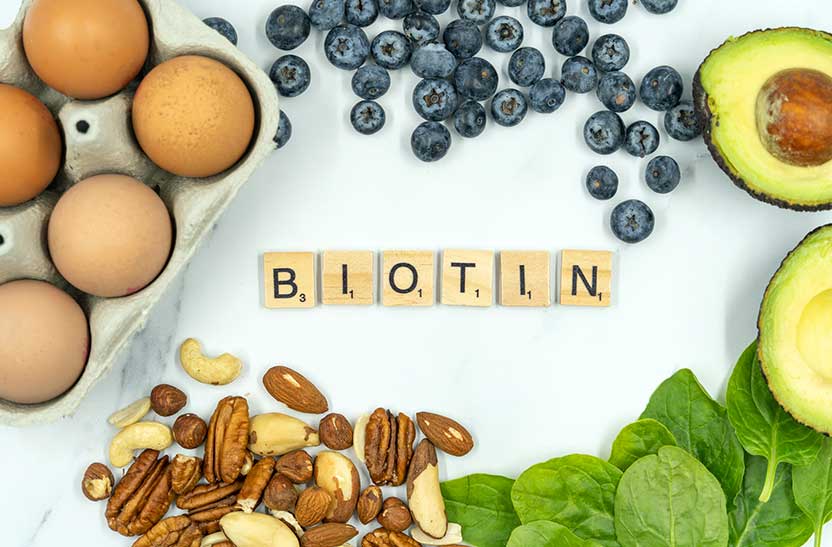How Helpful is Biotin for Hair Growth and Reducing Hair Loss?

Biotin, often called vitamin B7 or vitamin H, is a water-soluble B-complex vitamin that plays a crucial role in various bodily functions, including hair, skin, and nail health. It has gained popularity as a supplement for hair growth and reducing hair loss. But how effective is biotin for improving hair health? In this article, we’ll explore the role of biotin, its benefits, potential side effects, and whether it truly helps in combating hair loss.
What is Biotin and How Does It Work?
Biotin is essential for the body’s metabolism, helping convert nutrients into energy. It also supports keratin production, a key protein that makes up hair, skin, and nails. A biotin deficiency can lead to symptoms such as hair thinning, brittle nails, and dry skin, which is why this vitamin is often recommended for hair health.
The Benefits of Biotin for Hair Growth
1. Strengthens Hair Structure
Since biotin boosts keratin production, it helps strengthen the hair shaft, making hair more resilient to damage and breakage.
2. Reduces Hair Shedding
People with a biotin deficiency often experience increased hair shedding. Taking biotin supplements can help restore proper levels and reduce excessive hair loss.
3. Encourages New Hair Growth
Some studies and anecdotal evidence suggest that biotin can promote the growth of new hair, especially in individuals with deficiencies.
4. Improves Overall Hair Health
Biotin contributes to shinier, thicker, and healthier-looking hair by improving the body’s ability to produce and maintain keratin.
How to Take Biotin for Hair Growth
Biotin can be obtained from both food sources and supplements:
Food Sources of Biotin
- Eggs
- Nuts (almonds, walnuts, peanuts)
- Seeds (sunflower seeds)
- Sweet potatoes
- Bananas
- Avocados
- Spinach and other leafy greens
- Fish and meat (especially liver)
Know More: Lack of Which Vitamins Cause Hair Loss?
Biotin Supplements
Biotin supplements come in various doses, usually ranging from 1,000 mcg to 10,000 mcg per day. Most hair growth formulas contain around 5,000 mcg, which is generally considered safe for daily consumption. However, consulting a doctor before taking high doses is recommended.
Possible Side Effects of Biotin
While biotin is generally safe, excessive intake may lead to:
- Acne breakouts – Some people report an increase in acne when taking high doses of biotin.
- Digestive issues – High doses may cause mild stomach discomfort.
- Interference with lab tests – Biotin supplements can interfere with blood tests, leading to inaccurate results.
- Allergic reactions – Rare, but some individuals may be allergic to biotin supplements.
Does Biotin Really Work for Everyone?
While biotin can be beneficial for individuals with a deficiency, it may not work as effectively for those who already have sufficient biotin levels. If hair loss is caused by genetics, hormonal imbalances, or medical conditions, biotin alone may not provide significant results. A holistic approach, including a balanced diet, proper hair care, and addressing underlying health issues, is essential for healthy hair growth.
Conclusion
Biotin plays a crucial role in hair growth and reducing hair loss, especially for those with deficiencies. While it strengthens hair and may help prevent excessive shedding, its effectiveness varies from person to person. If you’re experiencing severe hair loss, consulting a healthcare professional to identify the root cause is always the best approach.
FAQ: Common Questions About Biotin and Hair Growth
1. How long does it take for biotin to show results for hair growth?
Biotin supplements typically take about 3 to 6 months of consistent use before noticeable improvements in hair growth and strength appear. Results vary depending on individual biotin levels and overall health.
2. Can I get enough biotin from my diet alone?
Yes, many people get sufficient biotin from a balanced diet that includes eggs, nuts, seeds, meat, and vegetables. Supplements are usually only necessary for individuals with deficiencies or those looking for an extra boost in hair health.
3. Are there any risks of taking too much biotin?
Biotin is water-soluble, so excess amounts are usually excreted through urine. However, very high doses may cause acne, digestive discomfort, or interfere with lab test results. It’s best to consult a doctor before taking high-dose supplements.
Biotin is a great addition to a hair-care routine, but it’s important to manage expectations and ensure a well-rounded approach to hair health.



